China Expands Renewable Energy Projects Using AI Analytics

China has announced the expansion of renewable energy projects across several provinces, leveraging artificial intelligence (AI) analytics to optimize production, distribution, and efficiency. The initiative focuses on wind, solar, and hydroelectric power installations, combining advanced technology with sustainability goals to enhance energy management and reduce environmental impact.
AI systems analyze weather patterns, energy demand, and grid performance to improve forecasting and operational planning for renewable energy facilities. By predicting fluctuations in solar irradiation, wind speeds, and water flow, operators can adjust energy storage and distribution in real-time, maximizing output while minimizing waste. This data-driven approach enhances grid stability and supports the integration of renewable sources into regional energy networks.
Provincial governments, including Inner Mongolia, Jiangsu, and Yunnan, are collaborating with technology companies and research institutions to deploy AI-powered monitoring and management systems. These systems enable predictive maintenance, detect equipment anomalies, and optimize resource allocation, reducing downtime and operational costs. AI-driven analytics ensure that renewable energy projects are economically viable and environmentally sustainable.
Industry experts note that combining AI with renewable energy supports China’s national objectives for carbon neutrality and sustainable growth. Efficient energy management reduces reliance on fossil fuels, lowers carbon emissions, and improves reliability of power supply. Real-time analytics also facilitate compliance with environmental regulations and improve transparency in project reporting.
Pilot programs utilizing AI analytics have already shown measurable improvements in energy output, operational efficiency, and cost reduction. The insights gained from these initiatives inform nationwide strategies for renewable energy deployment, including potential integration with smart grids, energy storage systems, and AI-assisted load balancing.
As renewable energy adoption expands, AI will play a crucial role in enabling adaptive, responsive, and intelligent energy systems. Integrating AI with sensor networks, predictive modeling, and grid management platforms ensures that renewable resources are utilized optimally, supporting China’s transition to a low-carbon economy.
China’s approach demonstrates how technological innovation, policy guidance, and practical implementation can work together to improve energy efficiency, sustainability, and operational effectiveness. By scaling AI-driven renewable energy projects, the country is reinforcing its leadership in clean technology while advancing environmental and economic objectives.







